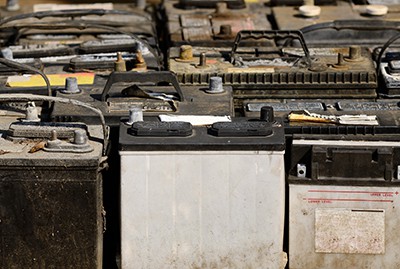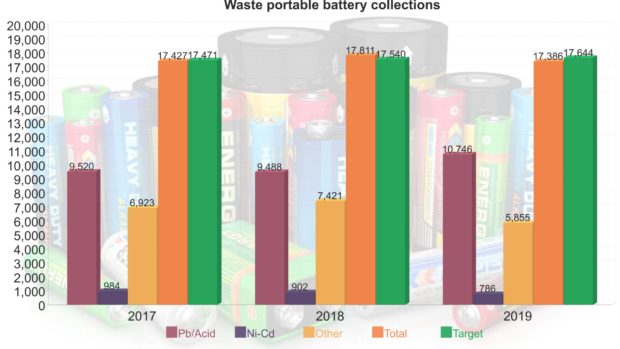The reason for the potential success is that compliance schemes have until 31 May 2020 to obtain evidence to meet their members’ obligations for the 2019 compliance period, and there is confidence this will be met.
The data revealed that the UK collected 17,386 tonnes of batteries in 2019, against a target of 17,644.
The UK target collection tonnage for 2019 is 45% of the average annual amount of portable batteries placed on the UK market in 2017, 2018 and 2019.
This target tonnage equates to 39,208 tonnes, meaning the UK’s collection rate for batteries stands at 44.34% in 2019 so far, down from 45.23% in 2018.
Lead acid
Despite the likelihood of eventually meeting the targets, concern remains over the high percentage of lead acid batteries in the figures.
Lead acid batteries are rechargeable and are often found in cars and motorbikes.
The data showed that there were 1,212 tonnes of lead acid batteries placed on the market in 2019, making up 3% of the total, but 10,746 tonnes were collected, 62% of total figure. Some lead acid batteries count as portable but there is ongoing uncertainty around the precise classification.
The disparity in collection rates is thought to stem from a difference in interpretation between battery recyclers and producers over which type of lead acid batteries are classified as being ‘portable’ or ‘industrial’ at the beginning and end of life.
“Defra is working with operators to assess the latest data returns and ensure businesses comply with the regulations”
This has led to a greater volume of lead acid batteries being collected for recycling than producers are obligated to finance. There are some concerns that the high number of lead acid batteries in the figures is masking the fact that not enough portable household batteries are being collected, and are instead ending up in landfill or incineration.
Defra
The Department for Environment, Food and Rural Affairs (Defra) explained to letsrecycle.com that the manufacturer or importer that first places batteries on the UK market – including those in products – is responsible for ensuring batteries are recycled under The Batteries and Accumulators (Placing on the Market) Regulations 2008 (as amended) and the Waste Batteries and Accumulators Regulations 2009.
A Defra spokesperson added that the “UK has a strong collection and treatment network for Pb/Acid batteries and the material value of the lead incentivises the collection of portable Pb/Acid batteries in excess of the 45% collection target”.
It added that “as a routine the department is “working with operators to assess the latest data returns and ensure businesses comply with the regulations”.
‘Mockery’
Dave Reynolds, managing director of EcoBat Logistics, claimed the figures make a “mockery” of the system.
“Battery evidence for lead acid batteries is around 800% of the amount declared as placed on the UK market by producers. This makes a mockery of the Waste Battery Regulations and the UK’s producer responsibility regime for portable batteries.
“We are working with our colleagues at HJ Enthoven, Defra and the regulators to create a more suitable regime. We look forward to the review of the regulations announced in the Resources and Waste Strategy which is planned for 2020. We need to be helping consumers change their battery recycling habits and recycle more alkaline batteries.”
Factors

Meanwhile, John Redmayne, managing director of the European Recycling Platform (ERP) compliance scheme, commented: “There are factors in the system which mean the UK often achieves just below the targets; in particular small producers don’t have to join a scheme but do have to post their data.
“As has become a pattern over the years, a significant number of other chemistry batteries were processed in Q4, as schemes worked to hit their obligations on behalf of members.”
Mr Redmayne added: “The government has indicated that it expects to a release a consultation on changes to the system in 2020. ERP is actively engaged with this and looks forward to the next steps.”
Weight
In 2016, the Environment Agency introduced legislation which meant that waste batteries weighing more than 4kg could no longer classed as ‘portable’.
Effective from 2017, it was hoped that this would clear up confusion, but the problem still appears to exist.

Peter Hunt, managing director of the Wastecare Group, said: “The problem seems to be getting worse. In 2019 portable lead evidence exceeded portable lead placed on the market by 786%.
“As things are there is very little we can do. In many ways a ‘false market’ has been created of trading lead-acid batteries as evidence, but these batteries are recycled anyway as they have a value. Every year this has been the same.”
Commenting on why this appears to be the case, Mr Hunt said: “One aspect is imports. Lead batteries could be being imported without being declared. Also, there could be an over-stating of what is portable. While some approved battery treatment operators only declare separately weighed and processed portable batteries, some still rely on protocols. That is to say that they attribute a percentage portable to a load and then apply it to all inbound weight.”
And Mr Hunt pointed to another potential discrepancy in the system. He noted: “A further possible distortion is the export of lead batteries that are claimed to be portable. Once shipped and smelted there is no evidence to prove whether they are portable or automotive.”






Subscribe for free